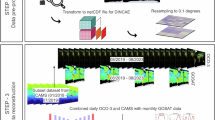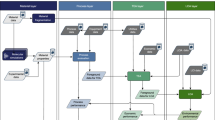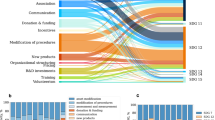Abstract
The first global stocktake under the Paris Agreement to assess implementation and progress towards achieving its long-term goals was completed in 2023. Here we reflect on the process and findings of the technical dialogue, based on our experience as co-facilitators, and describe innovations in the process, technical findings and evidence-based policy-making following a learning-by-doing approach. We point to the technical dialogue’s 17 key findings, across the topics of context, mitigation, response measures, adaptation, loss and damage, means of implementation and support, and finance flows, which were informed by the best available science and equity considerations. We also consider how the key findings informed the political outcome of the global stocktake and highlight the importance of the technical dialogue for ratcheting up climate ambition across all topics.
This is a preview of subscription content, access via your institution
Access options
Access Nature and 54 other Nature Portfolio journals
Get Nature+, our best-value online-access subscription
$32.99 / 30 days
cancel any time
Subscribe to this journal
Receive 12 print issues and online access
$259.00 per year
only $21.58 per issue
Buy this article
- Purchase on SpringerLink
- Instant access to the full article PDF.
USD 39.95
Prices may be subject to local taxes which are calculated during checkout


Similar content being viewed by others
References
Paris Agreement. Report of the Conference of the Parties on its Twenty-First Session, Held in Paris from 30 November to 13 December 2015 Annex to Decision 1/CP.21 FCCC/CP/2015/10/Add.1 21–36 (UNFCCC, 2015).
Cairney, P. The Politics of Evidence-Based Policy Making (Springer, 2016).
Report of the Conference of the Parties serving as the meeting of the Parties to the Paris Agreement on the third part of its first session, held in Katowice from 2 to 15 December 2018 Decision 19/CMA.1 FCCC/PA/CMA/2018/3/Add.2 (UNFCCC, 2018); https://unfccc.int/sites/default/files/resource/cma2018_3_add2_new_advance.pdf
Glasgow–Sharm el-Sheikh Work Programme on the Global Goal on Adaptation. Report of the Conference of the Parties serving as the meeting of the Parties to the Paris Agreement on its third session, held in Glasgow from 31 October to 13 November 2021 Decision 7/CMA.3 FCCC/PA/CMA/2021/10/Add.3 (UNFCCC, 2021).
Information Note on the First Meeting of the Technical Dialogue of the First Global Stocktake Under the Paris Agreement. Note by the Co-facilitators (UNFCCC, 2022); https://unfccc.int/sites/default/files/resource/GST_Technical_Dialogue_Information_Note.pdf
Information Note on the Second Meeting of the Technical Dialogue of the First Global Stocktake Under the Paris Agreement. Note by the Co-facilitators (UNFCCC, 2022); https://unfccc.int/sites/default/files/resource/GST%20TD1.2%20Information%20Note_20221007.pdf
Information Note on the Third Meeting of the Technical Dialogue of the First Global Stocktake Under the Paris Agreement. Note by the Co-facilitators (UNFCCC, 2023); https://unfccc.int/sites/default/files/resource/GST TD1.3 Information Note_0205.pdf
Technical Dialogue of the First Global Stocktake. Synthesis Report by the Co-facilitators on the Technical Dialogue FCCC/SB/2023/9 (UNFCCC, 2023); https://unfccc.int/documents/631600
Peringer, C. & Rietig, K. The Impact of Process Innovations in the Technical Dialogue of the First Global Stocktake (Better Climate Governance, 2024); https://betterclimategovernance.com/wp-content/uploads/2024/02/Report-Technical-Dialogue-Innovations-Feb-14-2024.pdf
Aidam, K. COP28 and the global stocktake: a weak attempt to address climate change. Front. Sustain. 5, 1388266 (2024).
Qi, J. J. et al. Reflections on the first global stocktake of the Paris Agreement. Earth Syst. Gov. 21, 100212 (2024).
Winkler, H., Watson, C. & Bhandari, P. M. Connecting Global Stocktake Outcomes and COP28 Workstreams (ODI Global, 2024); https://odi.org/en/publications/connecting-gst-outcomes-and-cop28-workstreams/
Technical dialogue of the first global stocktake. United Nations Climate Change https://unfccc.int/topics/global-stocktake/components-of-the-gst/technical-dialogue-of-the-first-global-stocktake#Our-art-collection (2024).
Summary Report on the First Meeting of the Technical Dialogue of the First Global Stocktake Under the Paris Agreement. Report by the Co-facilitators of the Technical Dialogue (UNFCCC, 2022); https://unfccc.int/sites/default/files/resource/GST%20TD1_1_sreport_26_09_2022_Final.pdf
Summary Report Following the Second Meeting of the Technical Dialogue of the First Global Stocktake Under the Paris Agreement. Report by the Co-facilitators of the Technical Dialogue (UNFCCC, 2023); https://unfccc.int/sites/default/files/resource/GST.TD_.2023.SummaryReport2_31March2023.pdf
IPCC Climate Change 2022: Impacts, Adaptation, and Vulnerability (eds Pörtner, H.-O. et al.) (Cambridge Univ. Press, 2022).
IPCC Climate Change 2022: Mitigation of Climate Change (eds Shukla, P. R. et al.) (Cambridge Univ. Press, 2022).
Outcome of the First Global Stocktake. Report of the Conference of the Parties Serving as the Meeting of the Parties to the Paris Agreement on its Fifth Session, Held in the United Arab Emirates from 30 November to 13 December 2023 Decision 1/CMA.5 FCCC/PA/CMA/2023/16/Add.1 (UNFCCC, 2023); https://unfccc.int/sites/default/files/resource/cma2023_16a01_adv_.pdf
COP 28/CMP 18/CMA 5 Presidency and Ministerial Consultations (UNFCCC, 2023); https://unfccc.int/cop28/cop-28-cmp-18-cma-5-presidency-consultations
Calvin, K. et al. IPCC Climate Change 2023: Synthesis Report (eds Core Writing Team, Lee, H. & Romero, J.) (IPCC, 2023).
Experience and Lessons Learned in Relation to Conducting the First Global Stocktake. Synthesis Report by the Secretariat FCCC/SB/2024/1 (UNFCCC, 2024); https://unfccc.int/documents/638443
Further Guidance in Relation to the Mitigation Section of Decision 1/CP.21 Decision 4/CMA.1. FCCC/PA/CMA/2018/3/Add.1 (UNFCCC, 2018); https://unfccc.int/sites/default/files/resource/4-CMA.1_English.pdf
Acknowledgements
We, the authors of this paper, were co-facilitators of the technical dialogue of the first global stocktake. We write in our personal capacities, and our views do not necessarily represent those of national governments or any organizations. While our experience as co-facilitators informs the perspectives that we lay out in this article, we recognize that the technical dialogue was only one part of the overall GST process. That process was Party-driven, with participation of non-Party stakeholders, and the outcome is a result of the work of many people. We thank all participants in the dialogue, the experts and facilitators in world café and roundtables, and the team in the UNFCCC Secretariat (UN Climate Change).The views expressed are those of the authors and not necessarily those of the US Government. Any errors in this paper are the responsibility of the authors.
Author information
Authors and Affiliations
Contributions
H.W. and F.A. contributed equally to the paper, jointly conceiving, outlining, writing and revising the paper.
Corresponding author
Ethics declarations
Competing interests
The authors declare no competing interests.
Peer review
Peer review information
Nature Climate Change thanks Adelle Thomas, Wolfgang Obergassel and the other, anonymous, reviewer(s) for their contribution to the peer review of this work.
Additional information
Publisher’s note Springer Nature remains neutral with regard to jurisdictional claims in published maps and institutional affiliations.
Rights and permissions
Springer Nature or its licensor (e.g. a society or other partner) holds exclusive rights to this article under a publishing agreement with the author(s) or other rightsholder(s); author self-archiving of the accepted manuscript version of this article is solely governed by the terms of such publishing agreement and applicable law.
About this article
Cite this article
Winkler, H., Akhtar, F. Navigating the technical dialogue of the first global stocktake from process to findings. Nat. Clim. Chang. 15, 37–43 (2025). https://doi.org/10.1038/s41558-024-02220-x
Received:
Accepted:
Published:
Version of record:
Issue date:
DOI: https://doi.org/10.1038/s41558-024-02220-x



